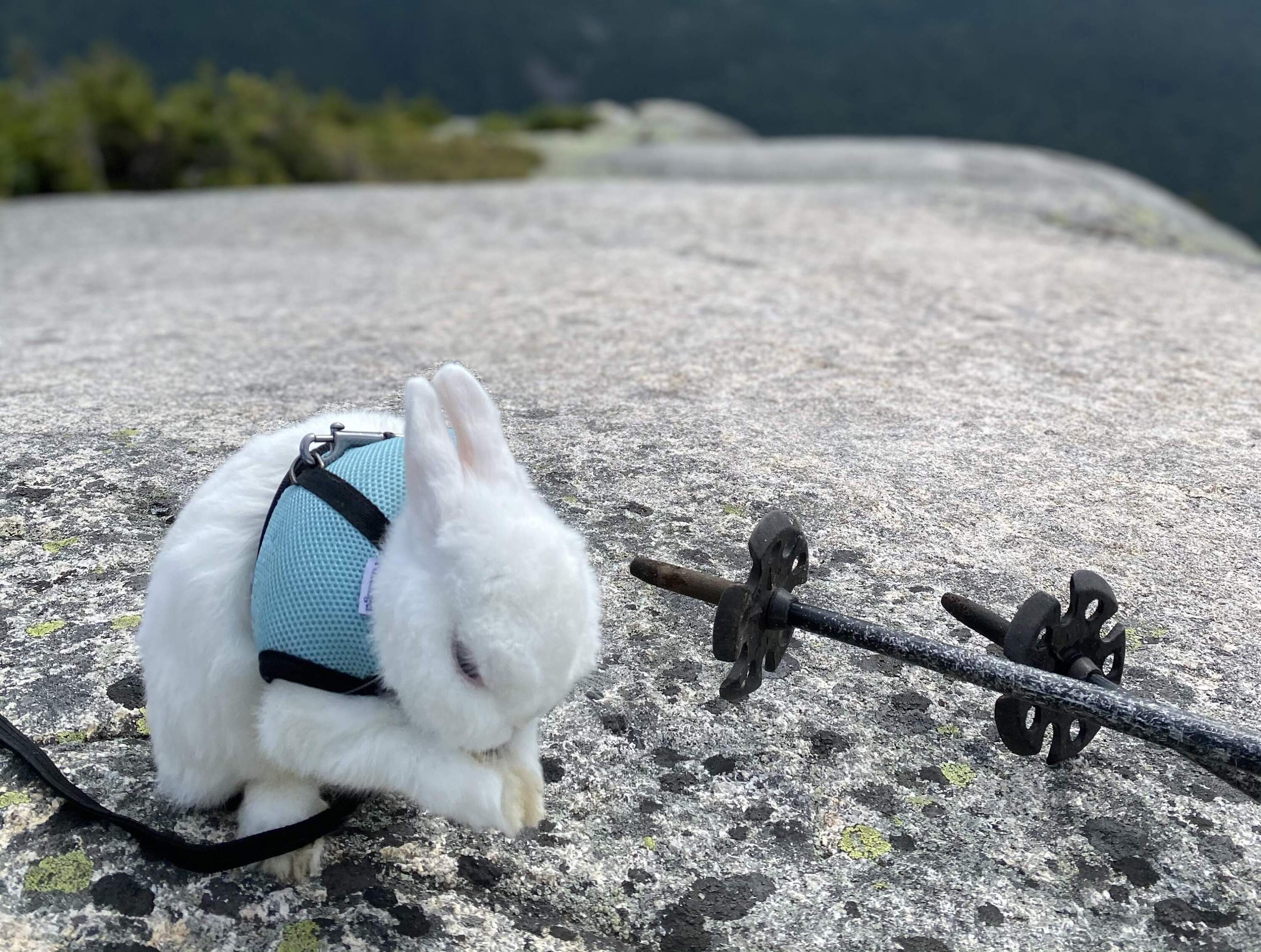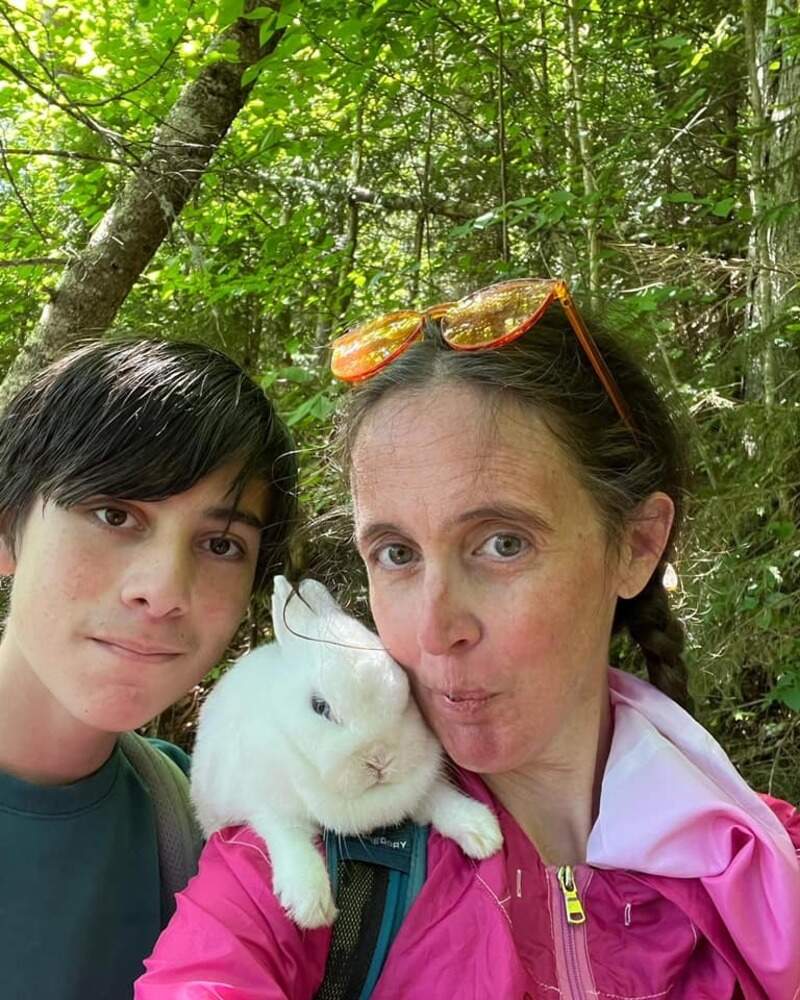Advertisement
Bunny summits all of New Hampshire's 4000-foot peaks, spreading joy along the way

Poppy Rose is an experienced hiker who has completed all of New Hampshire's 4,000 foot climbs.
She's only three short of hiking them again in winter. When she finishes those in January, she will hold the winter record — for bunnies.
At just two pounds, Poppy Rose is a small rabbit and a big part of a remarkable story. In 2020, New Hampshire hiker Bree Schuette’s former husband Chris died of COVID-19. Schuette started bringing their grieving 11-year-old son Aiden on hikes, but he missed Poppy Rose, so she came too.
By 2023, Schuette was diagnosed with relapsing polychondritis, a rare autoimmune disorder that causes inflammation and deterioration of cartilage. At times, the illness left her crawling on a hike. When she became too weak, she asked others, such as volunteer hiker Kim Beaulieu, to take Poppy Rose hiking.
Doctors in New Hampshire and Boston ran out of ideas to help her condition, so Schuette and Poppy Rose have temporarily relocated to Rochester, Minnesota, for treatment at the Mayo Clinic.
“I have good days and I definitely have bad days,” Schuette says. “I think one of the hard things for me being here is missing all of my connections in New Hampshire and definitely missing the mountains.”

4 questions with Bree Schuette and Kim Beaulieu
People that you didn't even know are signing up to take Poppy Rose hiking. How did you first know that it was okay to take a rabbit on a hiking trail?
Bree Schuette: “For a long time, I had had two rabbits, Poppy Rose and her much, much larger, furry, French Angora sister, Amelie. And I had taken Amelie on a handful of hikes, but I figured out quickly that 13 pounds of bunny is a lot of weight to add in the backpack.
“Poppy Rose had done a lot of volunteer work. The church in my town of Wolfeboro had monthly luncheons where they would bring people from nursing homes, people with developmental disabilities. I would bring Poppy Rose along to volunteer. And she loved meeting people. She had also done some volunteer hospice work and volunteer work with some veterans who were dealing with PTSD.
“So I knew Poppy loved people, but yes, there's a lot of danger out there in mountains. So I did do a lot of research, talked to other bunny owners and from the first hike on, she loved it.”
Does Poppy Rose come to you when you call her?
Schuette: “She does. We had done a lot of work at home with recall. Bunnies are super-duper smart, but not necessarily always trainable. They have little minds of their own. So we worked really hard to get her to come when she's called.”
Why did you want to bring Poppy Rose on a hike?
Kim Beaulieu: “How many people can say they went hiking with a bunny? Not many. And I was like, ‘Let's do it.’ It was just simply amazing to see this little two-pound fluff ball just look at you on her harness and then she just starts to take off going up the trail. And at one point, I felt like she was dragging me up it and I was like, ‘How is this little two-pound bunny dragging me up this mountain? ‘And it was just this is why I hike, to get this little thing up this mountain.”
Schuette: “She comes back from hikes with leaves in her fur and covered in mud and she is never happier than that.
Beaulieu: ‘She has a mind of her own, but she will tell you what she needs. She'll tell you when she needs it. You learned how to speak bunny that day. And any chance I get to do something with an animal, or someone who has an animal that can't do it, I am more than willing to do it.

Schuette: “I have been overwhelmed with the kindness of the hiking community. I don't even know how to put it into words.
“People who I had never met before stepped up to deliver meals as part of our meal train. I got gorgeous meals dropped off at my door during periods when I was too sick to stand and cook people have generously donated to the GoFundMe because the medical bills are daunting for rare diseases and people like Kim who've stepped up to hike with her.
“I think the first time I put it out on the hiking community Facebook pages, I was a little hesitant, not because I didn't think the hiking community was great, but I wondered, ‘Would anyone really be interested in doing it?’ And I think the first time I asked, ‘Can someone help her and help me?’ I had more than a hundred responses in less than an hour. ‘Of course, we'd love to take her. Tell us where she'd like to go.’ And that has continued on.
“And Poppy loves the experiences. And I also think the people who did it with her got a lot of joy, and like Kim mentioned, motivation from that. I know even when I was hiking with Poppy, there's moments on any hike when you may be tired or exhausted or think that you can't keep going. And then you look down at this little two-pound ball of fluff with teeny tiny legs, who's hopping up rocks or navigating through snow and ice. And it's kind of one of those reminders, “If Poppy can do it, so can I.’
Advertisement
“And it's also a great way to meet people on hikes. I think when my son first started, he was grieving and grieving so hard, the death of his father. And then on top of that, the world shut down around him, so there weren't a lot of outlets for him to meet people. And he's a pretty shy, introverted kid. And then when he started having Poppy on the leash, or in his arms, or in his backpack, suddenly, it was like this world of communication opened up to him, and it was really, really special for him.”
You've also written a book, “Poppy Rose, The Hoppy Adventures of a Tiny Mountain Bunny.” All proceeds from the book go towards your medical treatment. Do you think this is medicinal?
Schuette: “I 1,000% believe that it is so helpful for me. I tell people, she is the love of my animal life, and I would do anything for her and anything to see her happy, and seeing her happy makes me happy.
“Poppy really is the poster girl for resilience. When she came to me back in 2016, she was entirely unsure about humans. I like to describe her as the teeny bunny version of a feral cat. I got her, I opened her cage, and she scampered off and would peek out from underneath furniture and then hide for almost, I would say two to three months. And then one day she decided that I was her safe person, jumped up on the couch, watched TV with me, and we were best friends from that day forward.
“But both in learning to trust people like she did and in really doing something that's amazing for any animal, much less a tiny bunny, she's taught me so much about strength and resilience. And I mean, beyond words, I'm grateful for the hiking community, but I'm even more grateful for being blessed to be Poppy Rose's mom.”
Karyn Miller-Medzon produced and edited this interview for broadcast with Todd Mundt. Miller-Medzon adapted it for the web.
This article was originally published on December 05, 2024.
This segment aired on December 5, 2024.

